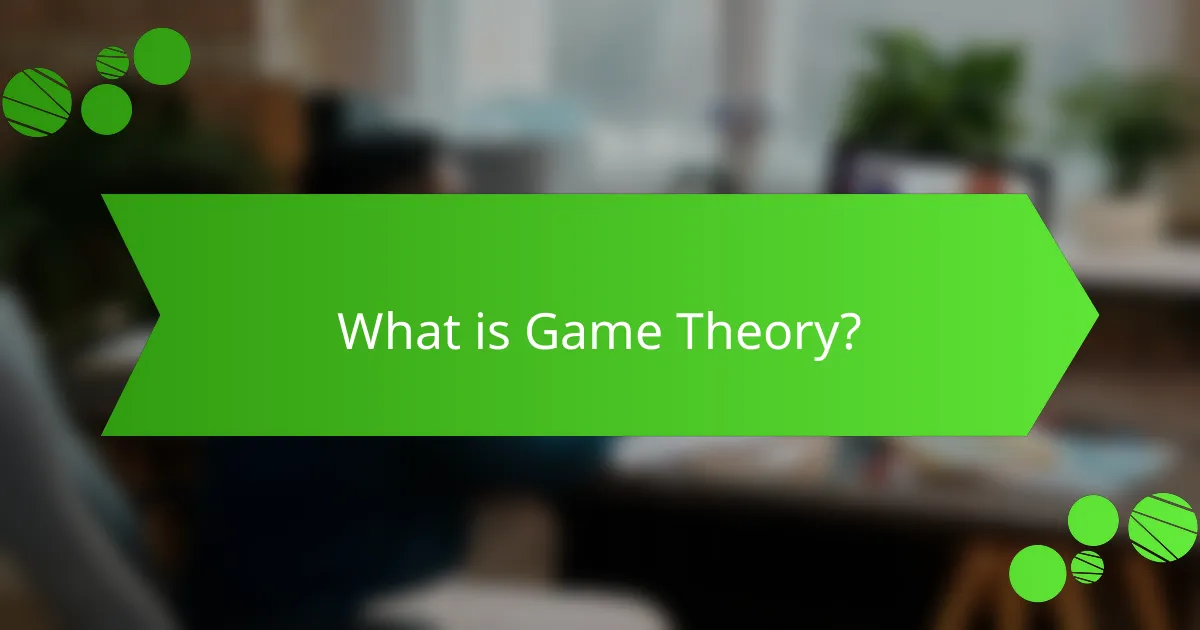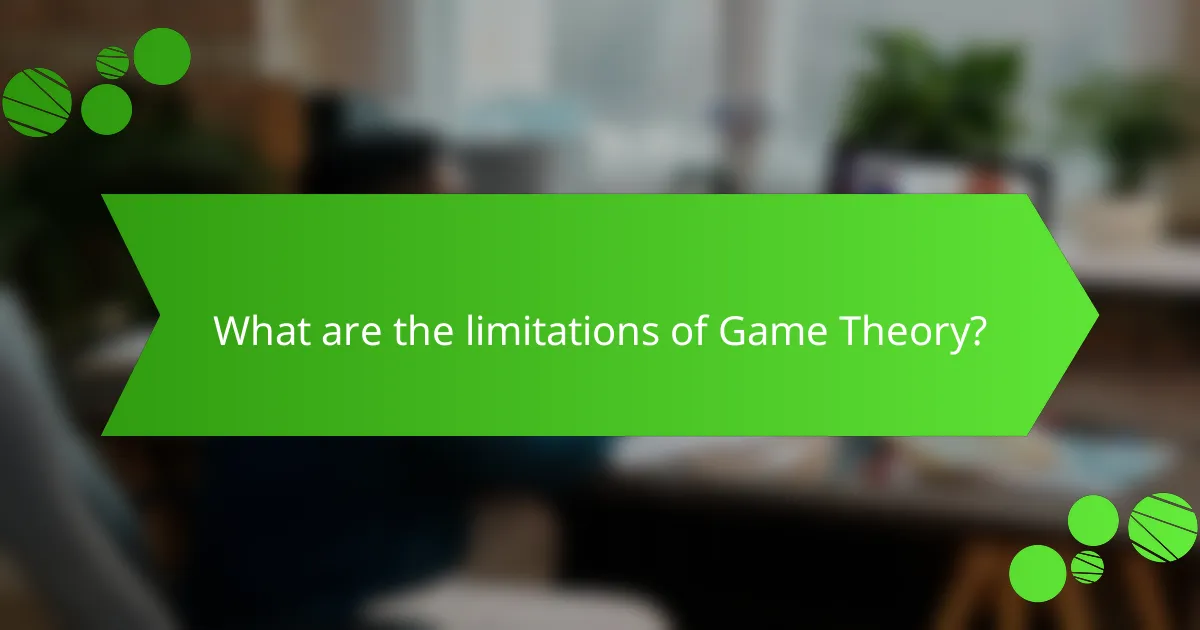Game theory is a mathematical framework used to analyze strategic interactions among rational decision-makers, focusing on players, strategies, and payoffs. This article explores the fundamental concepts of game theory, including its applications in economics, such as competitive behavior among firms, auction design, and negotiation strategies. It also addresses the limitations of game theory, highlighting assumptions of rationality, complexities of real-world scenarios, and reliance on complete information. By examining these aspects, the article provides a comprehensive understanding of how game theory informs strategic decision-making in various contexts.

What is Game Theory?
Game theory is a mathematical framework for analyzing strategic interactions among rational decision-makers. It studies how individuals make choices that affect one another’s outcomes. Key components include players, strategies, and payoffs. Players are the decision-makers in the game. Strategies are the plans of action chosen by players. Payoffs represent the outcomes resulting from the chosen strategies. Game theory applies to various fields, including economics, political science, and biology. It provides insights into competitive behavior and cooperation. Notable concepts include Nash equilibrium and dominant strategies. Game theory has been used to model market competition and auction designs.
How did Game Theory develop as a concept?
Game Theory developed as a concept in the early 20th century. It was formalized by mathematician John von Neumann and economist Oskar Morgenstern in their 1944 book “Theory of Games and Economic Behavior.” The concept emerged to analyze strategic interactions where the outcome depends on the choices of multiple agents. Early work included von Neumann’s minimax theorem, which addressed decision-making under conflict. The Nash equilibrium, introduced by John Nash in the 1950s, expanded the theory by describing stable outcomes in non-cooperative games. Game Theory gained traction in economics, political science, and biology due to its ability to model competitive situations. Its applications include auctions, bargaining, and market strategies, demonstrating its interdisciplinary relevance.
What are the historical milestones in the evolution of Game Theory?
Game Theory evolved through several historical milestones. In 1944, John von Neumann and Oskar Morgenstern published “Theory of Games and Economic Behavior.” This work laid the groundwork for modern Game Theory. In 1950, John Nash introduced the Nash Equilibrium concept. This concept became fundamental in understanding strategic interactions. In 1951, Nash’s work earned him the Nobel Prize in Economic Sciences. In the 1970s, Game Theory expanded to include evolutionary biology, thanks to John Maynard Smith’s work. In 1994, John Nash received the Nobel Prize for his contributions. These milestones highlight the significant development of Game Theory over time.
Who are the key figures in the development of Game Theory?
John von Neumann and John Nash are key figures in the development of Game Theory. John von Neumann is recognized for formulating the mathematical foundations of Game Theory. His 1928 paper introduced the concept of minimax strategies. John Nash contributed significantly with his Nash Equilibrium concept in 1950. This equilibrium describes optimal strategies in non-cooperative games. Other notable contributors include Oskar Morgenstern, who co-authored the foundational book “Theory of Games and Economic Behavior.” Additionally, Reinhard Selten expanded on Nash’s work and received a Nobel Prize in 1994. These figures collectively shaped Game Theory into a vital field in economics and social sciences.
What are the fundamental principles of Game Theory?
Game Theory is a mathematical framework for analyzing strategic interactions among rational decision-makers. The fundamental principles include the concepts of players, strategies, payoffs, and equilibrium. Players represent the decision-makers in the game. Strategies are the plans or actions players can take. Payoffs are the outcomes resulting from the players’ strategies. Equilibrium, particularly Nash Equilibrium, occurs when no player can benefit by changing their strategy while others keep theirs unchanged. These principles are foundational in economics, political science, and biology, illustrating how individuals or entities make decisions in competitive situations.
What is the concept of a game in Game Theory?
A game in Game Theory is a formalized interaction between multiple decision-makers. Each participant, known as a player, makes choices that lead to specific outcomes. The players aim to maximize their respective payoffs based on their strategies. The concept encompasses various types of games, such as cooperative and non-cooperative games. In cooperative games, players can form binding agreements. In non-cooperative games, players act independently. The Nash Equilibrium is a key concept, representing a stable state where no player can benefit from changing their strategy unilaterally. Game Theory applies to economics, politics, and social sciences, illustrating strategic decision-making.
How do players and strategies interact in a game?
Players and strategies interact in a game through decision-making processes. Each player selects strategies based on their objectives and the anticipated actions of others. The interaction is typically modeled using game theory, which analyzes how players make choices in competitive situations. Players’ strategies can be cooperative or non-cooperative, influencing outcomes. For example, in the Prisoner’s Dilemma, players must decide whether to cooperate or betray, affecting both their payoffs. The Nash Equilibrium illustrates a stable state where no player benefits from changing their strategy unilaterally. This interaction is critical in economics, as it helps predict market behaviors and outcomes in competitive environments.
Why is Game Theory important in various fields?
Game Theory is important in various fields because it provides a framework for understanding strategic interactions among rational decision-makers. It applies to economics by helping analyze market behaviors and competitive strategies. In political science, it aids in understanding voting systems and coalition formations. In biology, it explains evolutionary strategies among species. Game Theory also influences business decisions, guiding pricing strategies and negotiations. Furthermore, it is utilized in computer science for algorithm design and network security. The versatility of Game Theory across disciplines demonstrates its critical role in decision-making processes.
What role does Game Theory play in economics?
Game Theory plays a critical role in economics by providing a framework for analyzing strategic interactions among rational decision-makers. It helps economists understand how individuals and firms make decisions when their outcomes depend on the actions of others. Game Theory is used to model competitive and cooperative behaviors in markets. It informs pricing strategies, negotiation tactics, and market entry decisions. The Nash Equilibrium is a key concept, illustrating situations where no player can benefit from changing their strategy unilaterally. Research shows that Game Theory has applications in various fields, including auction design and contract theory. Its principles guide policymakers in regulating industries and anticipating market reactions.
How is Game Theory applied in political science and sociology?
Game theory is applied in political science and sociology to analyze strategic interactions among individuals or groups. It helps in understanding decision-making processes in competitive environments. Political scientists use game theory to model elections, legislative behavior, and international relations. For example, the concept of Nash equilibrium explains how political actors might settle on strategies that are stable given the strategies of others. In sociology, game theory examines social norms and cooperation among individuals. Researchers like Robert Axelrod have shown how cooperation can evolve through repeated interactions. Game theory provides a structured framework for predicting outcomes based on the choices of rational agents.

What are the applications of Game Theory in Economics?
Game theory has several applications in economics. It helps analyze competitive behaviors among firms. For example, in oligopoly markets, firms use game theory to determine pricing strategies. The Nash equilibrium concept is crucial in predicting outcomes in such markets. Game theory also applies to auction design and bidding strategies. Economists utilize it to study negotiations and bargaining scenarios. Additionally, it aids in understanding public goods and externalities. Overall, game theory provides a framework for strategic decision-making in economic contexts.
How does Game Theory influence market behavior?
Game Theory influences market behavior by modeling strategic interactions among economic agents. It provides a framework for understanding how individuals make decisions based on the expected actions of others. For example, firms use Game Theory to anticipate competitors’ pricing strategies. This can lead to price wars or collusion, affecting overall market prices. Research shows that Game Theory can predict outcomes in oligopolistic markets, where few firms dominate. The Nash Equilibrium concept illustrates how firms reach stable strategies where no one benefits from changing their action unilaterally. Studies in economics, like those by John Nash, highlight the significance of these interactions in real-world markets.
What are examples of Game Theory in pricing strategies?
Examples of Game Theory in pricing strategies include price matching, collusion, and auction bidding. Price matching occurs when companies set prices based on competitors’ pricing to maintain market share. Collusion involves firms coordinating pricing to maximize joint profits, as seen in oligopolistic markets. Auction bidding strategies illustrate how participants adjust their bids based on competitors’ actions, often analyzed using Nash Equilibrium. These strategies demonstrate how companies use Game Theory to make informed pricing decisions.
How does Game Theory explain competition among firms?
Game Theory explains competition among firms by modeling strategic interactions. It provides a framework for understanding how firms make decisions based on the anticipated actions of their competitors. Key concepts include Nash Equilibrium, where no player can benefit from changing their strategy unilaterally. Firms assess payoffs associated with different strategies. They consider rivals’ potential responses to their actions. For example, in oligopolistic markets, firms may engage in price wars or collusion. Historical cases, such as the Airline Deregulation Act of 1978, illustrate these dynamics. Firms adjust strategies to maximize profits while anticipating competitor behavior. Thus, Game Theory offers insights into competitive strategies and market outcomes.
What are the implications of Game Theory for decision-making?
Game Theory significantly influences decision-making processes. It provides a framework for analyzing strategic interactions among rational agents. Decision-makers can assess potential outcomes based on the actions of others. This analysis helps in predicting competitor behavior and market dynamics. Game Theory aids in identifying optimal strategies in competitive environments. Real-world applications include economics, political science, and negotiation tactics. A notable example is the Nash Equilibrium, where no player benefits from changing their strategy unilaterally. This concept illustrates stability in decision-making scenarios. Overall, Game Theory enhances understanding of complex decision-making situations.
How can Game Theory improve negotiation strategies?
Game Theory can improve negotiation strategies by providing structured frameworks for decision-making. It helps negotiators analyze potential outcomes based on the actions of all parties involved. By understanding concepts like Nash Equilibrium, negotiators can identify optimal strategies that maximize their benefits. Game Theory also encourages collaboration and trust-building, as parties recognize the advantages of cooperative solutions. Studies show that applying Game Theory principles in negotiations can lead to more favorable agreements. For example, research by Nash in 1950 demonstrated how strategic thinking can enhance negotiation outcomes. This analytical approach allows for better preparation and adaptability during negotiations.
What insights does Game Theory provide for risk assessment?
Game Theory provides insights for risk assessment by modeling strategic interactions among rational decision-makers. It helps identify optimal strategies in uncertain environments. Game Theory analyzes scenarios where the outcome depends on the actions of multiple agents. This analysis can reveal potential risks and rewards associated with different choices. For example, in economic contexts, it can assess competitive behaviors and market dynamics. The Nash Equilibrium concept illustrates stable outcomes where no player benefits from changing their strategy unilaterally. Additionally, Game Theory can inform risk management by evaluating cooperative strategies among stakeholders. This approach enhances decision-making by quantifying the impact of various risk factors.
How is Game Theory used in public policy?
Game theory is used in public policy to analyze strategic interactions among various stakeholders. It helps policymakers understand how individuals or groups make decisions that affect collective outcomes. For instance, game theory can model situations like voting behavior, public goods provision, and negotiations.
In environmental policy, game theory can illustrate how countries might cooperate or compete regarding climate change agreements. The Nash Equilibrium concept, a key element of game theory, provides insights into stable outcomes where no party benefits from changing their strategy unilaterally.
Research shows that applying game theory in public policy can lead to more effective strategies. Studies indicate that incorporating these models can enhance cooperation among competing entities. For example, a study by T. Sandholm in “Population Games and Evolutionary Dynamics” explores how game theory informs public policy decisions.
What are the applications of Game Theory in regulatory frameworks?
Game Theory is applied in regulatory frameworks to analyze strategic interactions among agents. It helps in understanding how regulatory policies can influence behavior in markets. For instance, it is used to design optimal auction mechanisms for public resources. Game Theory also aids in assessing compliance and enforcement strategies among firms. By modeling competitive scenarios, regulators can predict outcomes of different regulatory approaches. Additionally, it supports the analysis of cooperative behavior in industries, such as antitrust regulations. Empirical studies demonstrate that Game Theory enhances the effectiveness of regulatory interventions. Thus, its applications are vital in shaping efficient and equitable regulatory policies.
How does Game Theory assist in understanding public goods provision?
Game Theory assists in understanding public goods provision by analyzing strategic interactions among individuals. It highlights how individuals may underinvest in public goods due to the free-rider problem. This occurs when people benefit from resources they do not contribute to. Game Theory models can predict outcomes in scenarios where cooperation is essential for providing public goods. For instance, the Nash equilibrium illustrates how individuals may choose not to contribute, resulting in suboptimal provision levels. Studies, such as those by Samuelson, show that public goods require collective action for efficient allocation. Thus, Game Theory provides insights into the dynamics of cooperation and competition in public goods provision.

What are the limitations of Game Theory?
Game Theory has several limitations that affect its applicability and accuracy. One limitation is the assumption of rationality, which presumes all players act logically to maximize their utility. In reality, human behavior often deviates from this rational model due to emotions and biases. Another limitation is the complexity of real-world scenarios, where players face numerous variables and uncertainties. Game Theory typically simplifies these situations, which can lead to misleading conclusions.
Additionally, Game Theory often relies on complete information, assuming all players know the strategies and payoffs of others. However, in many real-life situations, information is asymmetric or incomplete. This can significantly alter the outcomes predicted by Game Theory. Furthermore, the focus on equilibrium strategies may overlook dynamic interactions and learning processes among players over time.
Lastly, Game Theory can be limited by its mathematical nature, making it less accessible for practical application in some fields. Despite these limitations, Game Theory remains a valuable tool in economics and social sciences, providing insights into strategic decision-making.
What challenges does Game Theory face in real-world applications?
Game Theory faces several challenges in real-world applications. One significant challenge is the assumption of rational behavior among participants. In reality, individuals often act irrationally due to emotions or cognitive biases. Another challenge is the complexity of predicting outcomes in multi-player scenarios. The number of possible strategies increases exponentially, making analysis difficult. Additionally, incomplete information poses issues. Players may not have access to all relevant data, leading to suboptimal decisions.
Moreover, real-world interactions often involve repeated games, which complicate strategy formulation. Players may change their behavior based on past experiences, unlike static models. Lastly, societal and cultural factors can influence decision-making. These factors are often not accounted for in traditional Game Theory models, limiting their applicability.
How does the assumption of rationality limit Game Theory’s effectiveness?
The assumption of rationality limits Game Theory’s effectiveness by presuming that all players act logically and with complete information. This assumption does not account for human emotions or cognitive biases that influence decision-making. Players may not always maximize their utility due to these factors. Research indicates that real-world decisions often deviate from rational models. For instance, behavioral economics shows that individuals frequently make irrational choices. This discrepancy can lead to predictions that do not align with actual outcomes in strategic interactions. Consequently, Game Theory may fail to accurately model scenarios involving human behavior.
What are the critiques regarding the predictive power of Game Theory?
Game Theory faces critiques regarding its predictive power. Critics argue that it relies on overly simplistic assumptions about rational behavior. Many real-world decisions are influenced by emotions and social factors, which Game Theory does not account for. Additionally, the concept of Nash Equilibrium may not always reflect actual outcomes in strategic interactions. Empirical studies have shown that players often deviate from predicted strategies. Furthermore, the complexity of human behavior can lead to unpredictable results that Game Theory fails to capture. These limitations challenge the reliability of its predictions in practical applications.
How does complexity affect the applicability of Game Theory?
Complexity significantly affects the applicability of Game Theory. Increased complexity can make it difficult to predict outcomes. Complex games often involve numerous players and strategies. This can lead to a vast number of potential outcomes. As complexity rises, the computational burden increases. Traditional methods may become inadequate for analysis. In some cases, simplified models are used to manage complexity. However, this can lead to oversimplification and loss of critical insights. Thus, while Game Theory offers valuable frameworks, its effectiveness diminishes with excessive complexity.
What role does information asymmetry play in Game Theory limitations?
Information asymmetry significantly impacts the limitations of Game Theory. It occurs when one party possesses more or better information than another in a strategic interaction. This disparity can lead to suboptimal decision-making. Players may make choices based on incomplete or inaccurate information. For instance, in market scenarios, sellers often know more about product quality than buyers. This can result in adverse selection, where low-quality products dominate the market. The classic example is the used car market, as described by Akerlof in “The Market for Lemons.” Here, information asymmetry leads to a failure in market efficiency. Therefore, information asymmetry restricts the predictive power and applicability of Game Theory in real-world scenarios.
How do dynamic games complicate the analysis in Game Theory?
Dynamic games complicate the analysis in Game Theory due to their sequential nature. In dynamic games, players make decisions at different points in time. This creates a complex interplay of strategies that evolves over the course of the game. Each player’s current choice can depend on past actions of themselves and others. This interdependence requires a deeper understanding of strategy than static games.
Moreover, dynamic games often involve incomplete information. Players may not know the payoffs or strategies of their opponents. This uncertainty adds layers of complexity to the analysis. Techniques such as backward induction become necessary. Backward induction requires players to anticipate future moves based on current choices.
Additionally, dynamic games can exhibit multiple equilibria. This means that there can be several potential outcomes based on the players’ strategies. The presence of multiple equilibria complicates predicting which outcome will occur. Overall, the sequential decision-making and strategic dependencies in dynamic games create challenges in analysis within Game Theory.
What are some common misconceptions about Game Theory?
One common misconception about Game Theory is that it only applies to competitive situations. In reality, Game Theory also analyzes cooperative scenarios. Another misconception is that it predicts outcomes with certainty. Game Theory often deals with probabilities and strategies rather than guaranteed results. Many believe Game Theory is solely about games and zero-sum situations. It encompasses a wide range of interactions, including negotiations and social dilemmas. Additionally, some think Game Theory assumes all players are perfectly rational. However, it also considers bounded rationality and behavioral factors. Lastly, a misconception is that Game Theory lacks real-world applications. In fact, it is widely used in economics, political science, and biology to model strategic interactions.
How does Game Theory differ from traditional economic theories?
Game Theory differs from traditional economic theories by focusing on strategic interactions among rational decision-makers. Traditional economic theories often assume individuals act independently to maximize their utility. Game Theory, however, considers how the actions of one participant affect the outcomes for others. This approach incorporates concepts like Nash equilibrium, where players reach a stable outcome that no one has an incentive to deviate from. Traditional economics typically does not account for such interdependence. Additionally, Game Theory applies to various scenarios, including competitive markets and negotiations, highlighting the importance of cooperation and competition. This multifaceted application distinguishes it from more linear traditional models.
What are the myths surrounding the practicality of Game Theory?
One myth surrounding the practicality of Game Theory is that it only applies to competitive situations. Game Theory also applies to cooperative scenarios. Another myth is that Game Theory requires complete information. Many models function under incomplete information assumptions. A common misconception is that Game Theory predicts outcomes with certainty. In reality, it often provides probabilities rather than definitive results. Additionally, some believe that Game Theory is only useful in economics. It has applications in political science, biology, and computer science as well. Lastly, there is a myth that Game Theory is too complex for practical use. Many simplified models exist that can be applied in real-world situations.
What best practices can enhance the use of Game Theory?
Utilizing best practices can significantly enhance the application of Game Theory. First, clearly define the players involved in the game. Understanding their objectives and strategies is crucial. Second, analyze the payoff structures for each player. This aids in predicting outcomes based on different strategies. Third, use simulations to model various scenarios. Simulations can reveal insights that theoretical analysis may overlook. Fourth, incorporate iterative play into the analysis. Repeated interactions can change players’ strategies over time. Fifth, ensure that assumptions about rationality are realistic. Many real-world decisions are influenced by emotions and biases. Sixth, collaborate with interdisciplinary teams. Insights from psychology, economics, and sociology can enrich the analysis. Lastly, continually update the model based on new data. This keeps the analysis relevant and accurate. These practices have been shown to improve decision-making in competitive environments.
How can practitioners effectively apply Game Theory in decision-making?
Practitioners can effectively apply Game Theory in decision-making by analyzing strategic interactions among rational agents. They can model scenarios using payoff matrices to evaluate outcomes based on different strategies. This allows practitioners to identify dominant strategies and Nash equilibria, guiding optimal choices. For instance, in competitive markets, businesses can anticipate rivals’ actions and adjust their strategies accordingly. Additionally, practitioners can use mixed strategies to introduce unpredictability, enhancing their competitive edge. Historical applications in economics demonstrate the effectiveness of this approach, such as in auctions and pricing strategies. Game Theory’s structured framework supports informed decision-making in uncertain environments.
What resources are available for learning more about Game Theory?
Books, online courses, and academic journals are key resources for learning about Game Theory. “Theory of Games and Economic Behavior” by John von Neumann and Oskar Morgenstern is foundational. “An Introduction to Game Theory” by Martin J. Osborne provides accessible insights. Online platforms like Coursera and edX offer courses from universities. The Journal of Game Theory publishes peer-reviewed articles. Websites like Khan Academy provide free educational videos. These resources cover various aspects of Game Theory comprehensively.
Game Theory is a mathematical framework that analyzes strategic interactions among rational decision-makers, focusing on players, strategies, and payoffs. This article covers the development of Game Theory, key figures like John von Neumann and John Nash, and its fundamental principles. It explores various applications in economics, political science, and sociology, highlighting its relevance in market behavior, negotiation strategies, and public policy. Additionally, the article addresses the limitations and challenges of Game Theory, including the assumptions of rationality and information asymmetry, while providing best practices for effective application in decision-making.



